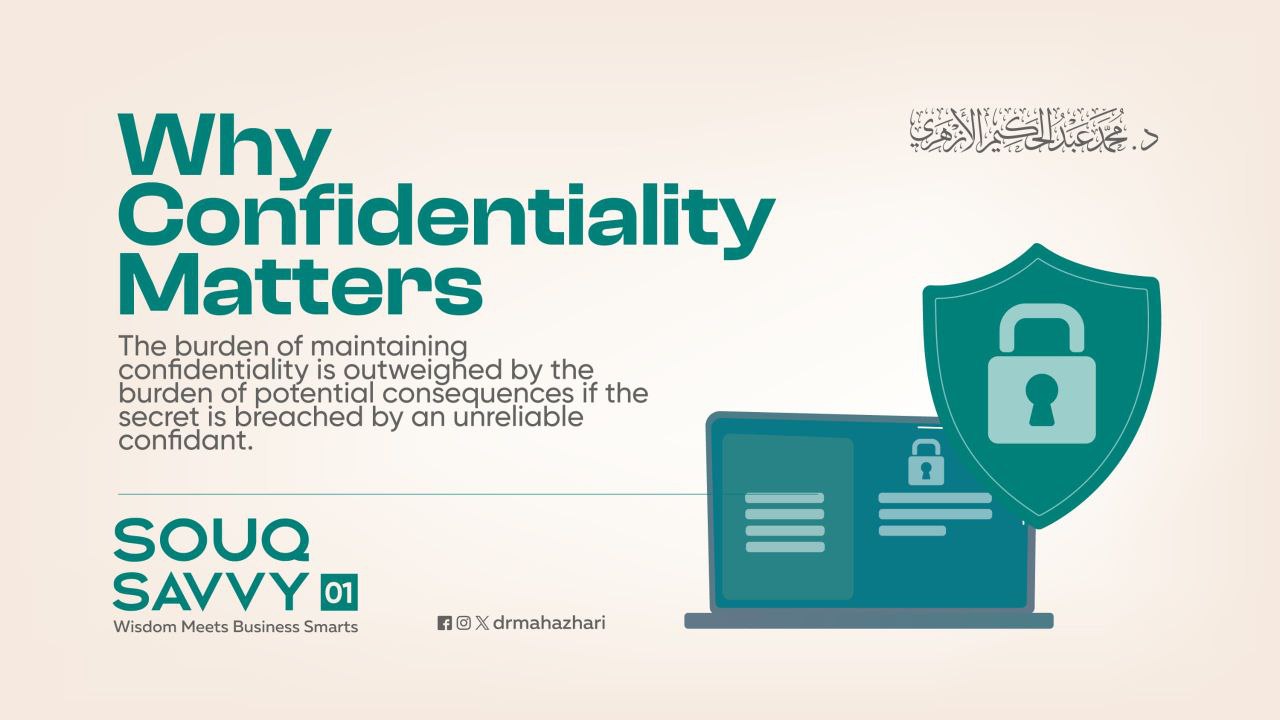Part: 1
Why Confidentiality matters
Dr. MAH Azhari

The burden of maintaining confidentiality is outweighed by the burden of potential consequences if the secret is breached by an unreliable confidant.
(The Book of Wisdom by Imam al-Haddad[R])
In the modern business environment, maintaining confidentiality or information privacy is paramount. This practice safeguards critical data such as proprietary information and client records, while concurrently fostering a climate of trust among stakeholders. Breaches of confidential information can yield severe consequences, as evidenced by notable incidents like the 2016 Uber data breach, wherein the personal data of millions of users was compromised, resulting in substantial financial penalties and reputational damage. Similarly, the 2018 Facebook privacy scandal underscored the repercussions of mishandling user data, emphasizing the significance of strong data security measures. On the other hand, companies that have strict privacy policies tend to enjoy certain advantages compared to others. Consequently, through creating well-defined rules & regulations on access permissions together with providing employees sustainable training programs about its organizations can promote an appropriate culture where information becomes a priority issue. Specifically, this results in both lower chances of security breaches and enhances trust among customers and staff that ultimately support long-run success.
Maintaining confidentiality extends beyond safeguarding client records and proprietary information; it also encompasses the privacy of board meetings and decisions. Various reasons make the confidentiality of board conversations and decisions indispensable. Firstly, it ensures that sensitive strategic plans and proprietary information discussed during these meetings remain protected from unauthorized access or disclosure, thereby safeguarding the competitive advantage of the organization. Secondly, it fosters an environment where board members can freely express their opinions, engage in robust debates, and make informed decisions without fear of information leaks or breaches of trust. Instances of breaches in boardroom confidentiality can have significant consequences, including damage to the organization's reputation, loss of shareholder trust, and potential legal repercussions. Like breaches in respecting client privacy can incur financial penalties and tarnish an organization’s image; violations on board code of conduct can destroy decision-making patterns integrity alongside eroding stakeholder confidence.
The tale of Hafsah bint 'Umar (R)ا further stresses the importance of privacy and confidentiality. When 'Umar ibn al-Khattab (R) sought potential suitors for his daughter, Hafsah (R)ا, he approached Abu Bakr (R) and 'Uthman ibn 'Affan (R), among others. Abu Bakr (R) and 'Uthman (R), both companions of the Messenger of Allah ﷺ, declined the proposal without disclosing the reason. However, it was later revealed that Abu Bakr (R) refrained from accepting the proposal because he knew that the Prophet Muhammad ﷺ had already mentioned Hafsah (R)ا as a potential wife for consoling Umar (R). Abu Bakr's (R) commitment to preserving the Prophet's ﷺ confidence highlights the ethical responsibility in protecting confidential information even in personal matters.
In a similar vein, Imam Nawawi’s (R) teachings in Sharh Muslim about trustworthiness and maintaining confidentiality in business management reverberate deeply. The suggestion made by Imam Nawawi underlines that it is ethically imperative for company heads to uphold confidentiality pacts and respect staffs’, customers’ or partners’ right to privacy. He said ‘The Muslim believer must protect secrets; those concerning his own house or someone else’s.’ If one has become privy to a secret or if someone confessed it to him, he cannot reveal it or its owner.” By integrating these principles into business practices, companies can cultivate a culture of trust, integrity, and professionalism, ultimately enhancing their reputation and long-term success.
